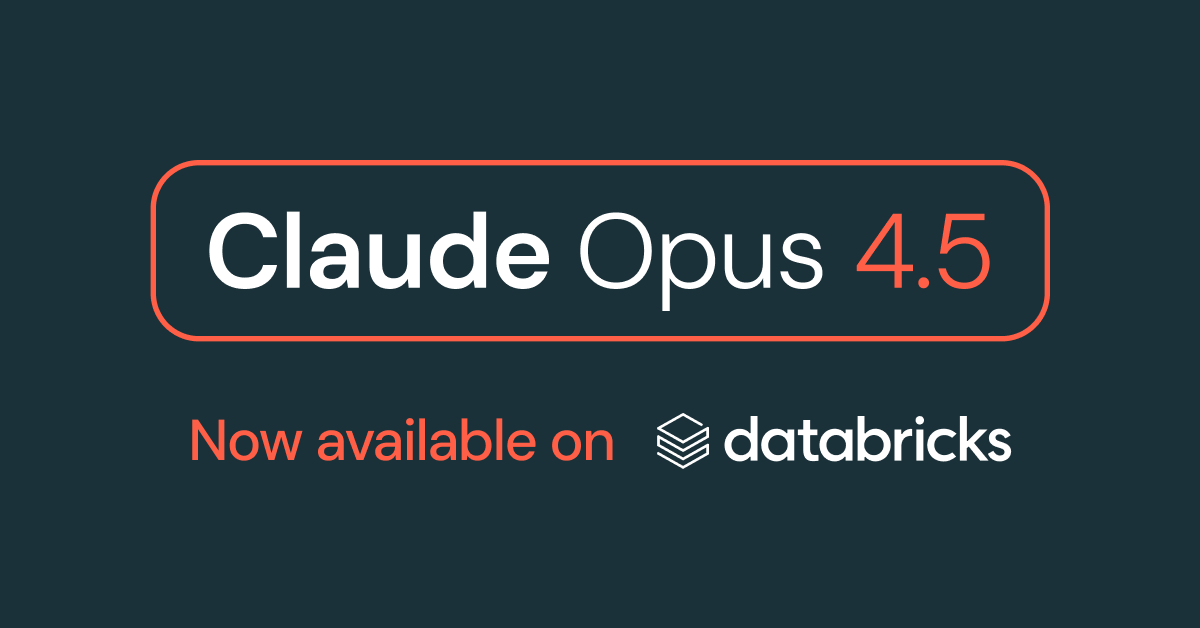Claude Opus 4.5 Is Here
The newly launched Claude Opus 4.5 is now available in DBSQL and Agent Bricks

Summary
- Run Claude Opus 4.5 at scale in DBSQL to reason over millions of rows, PDFs, or transcripts, with results written back to Delta tables.
- Automate GenAI ETL pipelines in Lakeflow by chaining Claude-powered steps like summarization, classification, agentic reasoning, and enrichment into workflows.
- Build agents and coding workflows with Agent Bricks that stay connected to enterprise data, databases, and retrieval systems on Databricks.
Customers process exabytes of data daily on Databricks, and generative AI is already transforming those data engineering pipelines with new capabilities. We’re pleased to help customers accelerate that transformation with Claude Opus 4.5 and Claude Sonnet 4.5, Anthropic’s new frontier model, which can now be directly applied to your governed data at scale through DBSQL and used to build agents with Agent Bricks.
Claude Opus 4.5, released just weeks after Claude Opus 4.1, demonstrates the rapid pace of innovation in generative AI. With Databricks, enterprises don’t have to worry about trying to keep up. Claude Opus 4.5 is the latest example of how we bring the best models from any provider directly to your governed enterprise data—so that you can evaluate and choose the right model for the job, then easily switch as models and needs evolve, all while running efficiently at scale.

What’s new with Claude Opus 4.5
Claude Opus 4.5 is Anthropic's most powerful model, which sets a new standard across coding, agents, computer use, and office tasks—outperforming both Sonnet 4.5 and Opus 4.1 while making Opus-level intelligence accessible at one-third the cost. Claude Sonnet 4.5 is specifically engineered to strike an optimal balance between quality and speed while delivering enhanced domain expertise across coding, finance, and research.
Key use cases:
- Long-running agents: Enable agents to tackle complex, multi-step tasks that require peak accuracy—like autonomously managing multi-channel marketing campaigns or orchestrating cross-functional enterprise workflows. Programmatic tool calling lets agents execute tools directly in Python.
- Coding: Claude Opus 4.5 excels at autonomous long-horizon coding tasks, capable of planning and executing complex software projects that span hours or days. It can work with a broader set of language support and enhanced behaviors, such as more efficient code, better test coverage, and cleaner architecture choices.
Financial analysis: Claude Opus 4.5 can handle various financial analysis tasks, from entry-level to advanced predictive analysis. It can leverage memory to maintain context and consistency across files, including an improvement in creating spreadsheets, slides, and docs.
Enterprise Data Meets Frontier AI
Enterprises generate vast amounts of unstructured data, from contracts and regulatory filings to support tickets and research papers. This information holds critical insights but has been notoriously difficult to work with at scale. Generative AI now makes it possible to unlock the insights this data holds, automating tasks like information extraction, summarization, and prediction that were once too time-consuming or complex to do broadly.
Yet, accessing these insights at production scale remains a challenge. Data has to be exported to external APIs, stitched back together, and managed across separate tools. This creates governance risks, breaks lineage, and slows adoption.
That is why we introduced AI Functions, a simple way to apply LLMs directly to governed enterprise data. Instead of moving data out of secure systems, Databricks brings AI models to your data so you can extend existing data pipelines with AI while preserving governance, lineage, and observability.
Now with Claude 4.5, AI Functions take their next big leap forward. Enterprises can move beyond simple analysis to tackle complex multi-step reasoning, scaling their most important work with confidence. This unlocks use cases such as analyzing obligations in contracts, detecting compliance risks in filings, and distilling research into structured insights, paving the way for enterprises to turn complex unstructured data into actionable intelligence at scale.
Gartner®: Databricks Cloud Database Leader
Applying Claude 4.5 on Your Data
Run Directly from SQL
Claude Opus 4.5 and Sonnet 4.5 can be used like a built-in operator in SQL or Python, making it simple to analyze contracts, PDFs, transcripts, or images directly where your data lives. When you run these queries, Databricks automatically scales Claude capacity in the backend to handle everything from a handful of rows to millions, ensuring fast and reliable results without extra setup.
Build End-to-End GenAI ETL Pipelines with Lakeflow
For production, Claude can be chained into Lakeflow pipelines to build GenAI ETL: ingesting data from systems like Salesforce or Amazon S3, applying AI transformations such as summarization or classification, and orchestrating the flow with built-in governance and observability.

Bring Agents to your data with Claude 4.5 and Agent Bricks
With Databricks Agent Bricks, enterprises can apply Claude 4.5 to domain-specific use cases. Agent Bricks builds and evaluates agents on enterprise tasks, tunes them, and continuously improves their performance, ensuring they deliver measurable quality in production.
Getting Started
Claude Opus 4.5 will begin rolling out to supported Databricks workspaces today and Sonnet 4.5 is already available. You can:
- Use the Mosaic AI Playground to easily get started with Claude 4.5 and compare it against existing models.
- Try Claude 4.5 with AI Functions directly in SQL and Python.
- Build GenAI ETL pipelines with Claude in Lakeflow.
- Explore real-time, domain-specific agents with Claude 4.5 and Agent Bricks.
Never miss a Databricks post
What's next?

Product
November 21, 2024/3 min read

